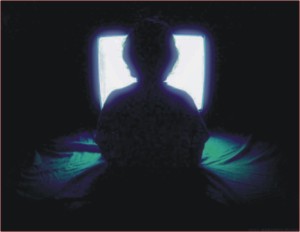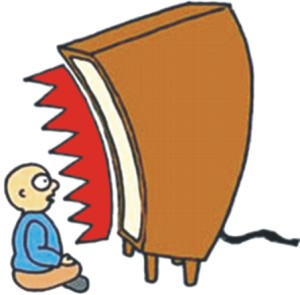Last & Least
A bleak vision of television
Dr Binoy Barman
Whenever I read the poem “Television” by Roald Dahl, I am not only entertained by its sublime wits but also transported to a serious contemplation of child rearing, vis-à-vis allowing children in watching TV at home. The poem raises an important question: Should our children be left to TV for passing time? On the question, Dahl's answer is “no”. He thinks television has a negative impact on child psychology. He terms television an 'idiotic' object. So he advises parents:
“The most important thing we've learned,
So far as children are concerned,
Is never, NEVER, NEVER let
Them near your television set --
Or better still, just don't install
The idiotic thing at all.”
I have thought a lot about Dahl's objection to television for children. Television is a reality of time governed by science and technology. It is a part and parcel of modern life. Among its other roles, television is also regarded as an important medium of instruction. Children can be amused and educated through instructive programmes in this wonder box, can't they? Then, why does Dahl deny its role and asks parents to keep it away from their children? We can take up the suggestion of Dahl and find arguments for this.
Children are particularly attracted to TV programmes as they like easy entertainment. Parents also allow them to watch TV as it stops their romping around, to the temporary relief of the caretaking adults. Children are fond of cartoon programmes. Their eyes are glued to the TV screen when they witness the grotesque figures and actions. Dahl observes, with a parenthetical exaggeration:
“They loll and slop and lounge about,
And stare until their eyes pop out.
(Last week in someone's place we saw
A dozen eyeballs on the floor.)”
Children get so engrossed in TV that they forget to eat on time so that their health declines. Their eyesight may also be affected by continuous gazing at the TV. They form a habit to become couch potatoes. As they keep sitting for longer period they get fatter with the risks of various diseases. They do not grow up as healthy citizens and fall short of contributing to the nation.
 TV makes the children lazy. Holding the remote control in hand, they surf through the channels whereby there is little physical movement. They become so lazy that they even neglect their school lessons. They do not read and finish their homework properly. This affects their academic performance, reflected in poor scores in examinations. Their future becomes bleak and they fail to gain success in life. They cannot achieve anything great in practical field. Their power of creativity is also spoiled in laziness. Too much watching TV creates an addiction among the children. Once addicted, they cannot do without it any more. This causes huge waste of time, which could be utilised in a more fruitful way. TV makes the children lazy. Holding the remote control in hand, they surf through the channels whereby there is little physical movement. They become so lazy that they even neglect their school lessons. They do not read and finish their homework properly. This affects their academic performance, reflected in poor scores in examinations. Their future becomes bleak and they fail to gain success in life. They cannot achieve anything great in practical field. Their power of creativity is also spoiled in laziness. Too much watching TV creates an addiction among the children. Once addicted, they cannot do without it any more. This causes huge waste of time, which could be utilised in a more fruitful way.
With watching continuous TV, children's mind becomes disorderly. They become the denizens of fantasy. They let loose their fantastic propensities and fly far away from reality. They fail to distinguish between good and bad, useful and useless, true and untrue. They do not interact sufficiently with the peers and superiors in practical scenes and hence gain a weak sense of communicative norms. They get baffled when they encounter a difficult problem and fail to overcome it. They may have some imagination but that is rife with absurdity and silliness. They grow up in illusion with weak and fragmented personality. Dahl cautions:
“IT ROTS THE SENSE IN THE HEAD!
IT KILLS IMAGINATION DEAD!
IT CLOGS AND CLUTTERS UP THE MIND!
IT MAKES A CHILD SO DULL AND BLIND
HE CAN NO LONGER UNDERSTAND
A FANTASY, A FAIRYLAND!
HIS BRAIN BECOMES AS SOFT AS CHEESE!
HIS POWERS OF THINKING RUST AND FREEZE!
HE CANNOT THINK -- HE ONLY SEES!”
With too much dependency on TV, children become lonely as they get less association of human beings. Humane qualities and humanitarian feelings are hindered from developing soundly in them. Machines are felt closer to them and human beings are held in secondary importance. Like machine they turn emotionless and the sentient beings appeal feebly to them. They acquire a mechanistic philosophy, where religious and moral values carry little importance. They cannot enrich their lives with proper spiritual enlightenment. They are trapped in the virtual reality where humans are merely shadows devoid of actual existence. They lack internal vigour and beauty of human heart.
There are other dangers. Through the programmes of foreign channels, the children in conservative society, like ours, are exposed to alien cultures. They get an idea of foreign behavioural norms. They learn the foreign names and words and forget their own. In the process they lose respect for indigenous cultural heritage and assess the foreign culture over their own. This acts against the patriotic glory, ultimately making them apathetic to national interest. They often witness the scenes of violence and tend to exercise it in their own life. They learn aggressive behaviour particularly from the action movie scenes. Children's sense of fashion is also influenced by the foreign elements. They follow the lifestyles of foreign film or pop stars and clutch them to their bosom.
 Confined within the four walls of drawing room and set in front of TV, the children grow up as the chickens in poultry farms. They remain chicken-hearted. They show less curiosity than average and hence cannot make any real drive to know the unknown and do the undone. They suffer from an inertia which prevents them from going full steam ahead. They become introvert in nature and distracted from any adventurous feat. They cannot move out to conquer the mountain peak or the depth of ocean. They are more accustomed to scanning a map than treading the lands in far flung locations. And they cannot gain success in certain jobs that involve challenge and bravery. Their inspiration is cartoon heroism rather than the practical heroism of battle field. Confined within the four walls of drawing room and set in front of TV, the children grow up as the chickens in poultry farms. They remain chicken-hearted. They show less curiosity than average and hence cannot make any real drive to know the unknown and do the undone. They suffer from an inertia which prevents them from going full steam ahead. They become introvert in nature and distracted from any adventurous feat. They cannot move out to conquer the mountain peak or the depth of ocean. They are more accustomed to scanning a map than treading the lands in far flung locations. And they cannot gain success in certain jobs that involve challenge and bravery. Their inspiration is cartoon heroism rather than the practical heroism of battle field.
As an impact of TV, children fail to develop a sound reading habit. The time they could invest in reading is spent in watching TV. This hampers their intellectual development. They cannot think in depth and argue clearly. They are deprived of pleasure of reading. Beyond the bounds of school syllabus, they have no patience to read different books in the broad area of knowledge. As a result their common sense as well as general knowledge gets stuck at an immature level. They do not even feel the urge to enhance knowledge. Their only pleasure is in watching TV, which snatches away their ability to perceive life and other phenomena in a coherent way.
So, what should the parents do? Dahl suggests that parents should remove the TV set from the children's room. They would instead give books in children's hands, which might save them from the monstrous effect of TV.
“Go throw your TV set away,
And in its place you can install
A lovely bookshelf on the wall.”
Children may not like it instantly and initially. But gradually they will be accustomed to it. Once accustomed, they will discover great pleasure in reading:
“That, in about a week or two
Of having nothing else to do,
They'll now begin to feel the need
Of having something to read.
And once they start -- oh boy, oh boy!
You watch the slowly growing joy
That fills their hearts. They'll grow so keen
They'll wonder what they'd ever seen
In that ridiculous machine,
That nauseating, foul, unclean,
Repulsive television screen!
And later, each and every kid
Will love you more for what you did.”
That is the victory of mind and the defeat of machine. That is the triumph of wisdom over imbecility.
(The writer is Assistant Professor and Head, Department of English, Daffodil International University.)
| 